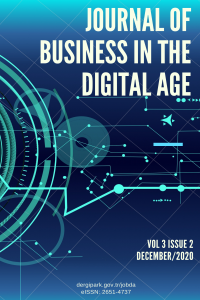Abstract
Factory arrangement means that factories are designed in the most suitable way in production systems. The layout is directly related to elements such as materials and personel. From this point of view, the main purpose of the factory arrangement can be defined as minimizing the movements in the factory in terms of production. In this study, the studies related to factory regulation were examined and tried to be explained in as much detail as possible. In addition to the literature, the problem of settlement was investigated in a factory that operates in the steel door sector by using VIP-PLANOPT 10 software, which is the workplace organizing program. This application consists of both the results of the program and the heuristic layout with expert opinion. The aim of this study is to provide a guiding source for the researchers who are working on the regulation of the factory with the practice of real business through the literature review.
Keywords
References
- Erkanlı, T. (1972). Fabrika Yerleştirme Düzeni. Sevk ve İdare Dergisi. Sayı: 51: 45-58.
- Fıratlı, E. (1984). İmalat Sanayinde Fabrika İçi Yerleşim Düzenlemesi ve Eskişehir Bölgesinde Uygulamasının İncelenmesi. Eskişehir: A.Ü Yayınları. Cilt.11, no.2.
- Francis, R. L. And White, J. A. (1974). Facility Layout and Location. Prentice-Hall, Inc., Englewood Cliffs. New Jersey, pp. 60-65.
- Harding, H. A. (1984). Production Management, Fourth Edition, Macdonald and Evans Limited. Plymouth.
- Hiregoudar, C. and Reddy, B. R. (2007). Facility Planning & Layout Design: An industrial perspective. India: Technical Publications Pune.
- Kobu, B. (1984). Üretim Yönetimi. İstanbul: İstanbul Üniversitesi Yayınları.
- Lockyer, K. (1983). Production Management, London: Pitman.
- Meller, R. D. and Bozer, Y. A. (1996). A New Simulated Annealing Algorithm for the Facility Layout Problem. International Journal of Production Research. 34(6):1675-1692.
- Reed, R. (1970). Fabrika Yerinin Seçimi, Yerleştirme Düzeni ve Bakımı. Ankara: Milli Produktivite Yayınları.
Abstract
Fabrika düzenleme, üretim sistemlerinde, fabrikaların en uygun biçimde tasarlanması anlamı taşımaktadır. Yerleşim düzeni, malzeme ve personel gibi unsurlar ile direkt ilgilidir. Bu düşünceden yola çıkarak, fabrika düzenlemedeki asıl amacın, fabrika içinde üretimsel anlamda hareketlerin en aza indirilmesi olarak tanımlanabilir. Bu çalışmada, fabrika düzenleme ile ilgili çalışmalar incelenmiş, olabildiğince detaylı açıklanmaya çalışılmıştır. Yapılan araştırmalara ilave olarak çelik kapı sektöründe faaliyetine devam eden bir fabrikada, işyeri düzenleme programı olan VIP-PLANOPT 10 yazılımı kullanılarak yerleşme problemi incelenmiştir. Bu uygulama hem programın sonuçlarından hem de uzman görüşlü alternatif yerleşim düzeninden oluşmaktadır. Bu çalışmanın hedefi, yapılan literatür taraması ile reel işletme üzerindeki uygulamayla fabrika düzenleme konusunda çalışmalarda bulunan araştırmacılara yol gösterici kaynak oluşturmaktır.
Keywords
References
- Erkanlı, T. (1972). Fabrika Yerleştirme Düzeni. Sevk ve İdare Dergisi. Sayı: 51: 45-58.
- Fıratlı, E. (1984). İmalat Sanayinde Fabrika İçi Yerleşim Düzenlemesi ve Eskişehir Bölgesinde Uygulamasının İncelenmesi. Eskişehir: A.Ü Yayınları. Cilt.11, no.2.
- Francis, R. L. And White, J. A. (1974). Facility Layout and Location. Prentice-Hall, Inc., Englewood Cliffs. New Jersey, pp. 60-65.
- Harding, H. A. (1984). Production Management, Fourth Edition, Macdonald and Evans Limited. Plymouth.
- Hiregoudar, C. and Reddy, B. R. (2007). Facility Planning & Layout Design: An industrial perspective. India: Technical Publications Pune.
- Kobu, B. (1984). Üretim Yönetimi. İstanbul: İstanbul Üniversitesi Yayınları.
- Lockyer, K. (1983). Production Management, London: Pitman.
- Meller, R. D. and Bozer, Y. A. (1996). A New Simulated Annealing Algorithm for the Facility Layout Problem. International Journal of Production Research. 34(6):1675-1692.
- Reed, R. (1970). Fabrika Yerinin Seçimi, Yerleştirme Düzeni ve Bakımı. Ankara: Milli Produktivite Yayınları.
Details
| Primary Language | Turkish |
|---|---|
| Subjects | Economics |
| Journal Section | Original Scientific Articles |
| Authors | |
| Publication Date | December 31, 2020 |
| Published in Issue | Year 2020 Volume: 3 Issue: 2 |


